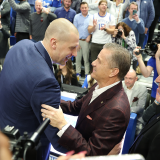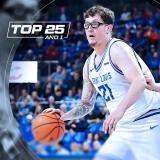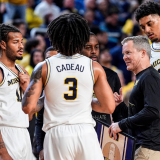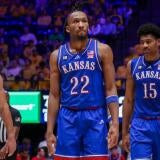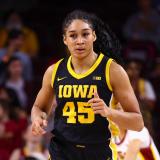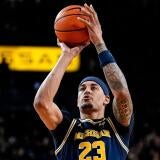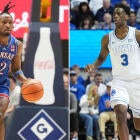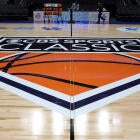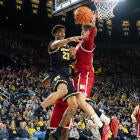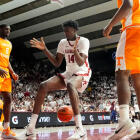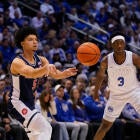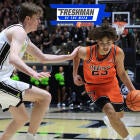
How a dismissal, fatherhood and Creighton helped Marcus Foster reclaim his passion
The Kansas State transfer has become a leader for the Bluejays
Long before his fall, and long before the redemption that currently has the 22-year-old senior as the leading scorer for the 25th-ranked Creighton Bluejays, Marcus Foster was a toddler who saw every round object as a basketball, and every receptacle as a hoop.
Piece of paper? Crumple it into a ball, aim for the trash can. Dirty laundry? Marcus would step back from downtown and toss it into the hamper. Every night before he went to bed, starting at age 2, Marcus would lay out on the table all his gear from Hirschi High School, the school in Wichita Falls, Texas where his oldest sister, Genedra, played for the girls' basketball team: jersey, headband, wristband, water bottle. Nobody was allowed to touch it until morning. When his parents, Melvin and Alvita Foster, were leaving in the morning for 12-hour shifts at the CertainTeed fiberglass reinforcements factory where they both worked, Marcus was suiting up, and the ball would start bouncing. His grandmother-slash-babysitter would queue up an old Los Angeles Lakers game on the television, and Marcus would emulate his idols: Magic Johnson, James Worthy and, most of all, Kobe Bryant.
"We had a basketball goal that hung over main door," his mother recalls. "We'd go to work for 12 hours and come back at 8 p.m. And he'd still be shooting. We'd look at my mother-in-law and ask, 'What has he done all day?' And she'd say, 'Same thing he was doing when y'all left the house.' "
To everyone who knew young Marcus, the cliché was the truth: He had been born to play this game. As a 4-year-old, Marcus would come to his sister's basketball games suited up in that Hirschi High School gear, and the moment the horn sounded for halftime, he'd sprint out to the court with his ball and start putting up shots, the whole crowd watching him.
The family replaced a section of the living room carpet with vinyl flooring so Marcus could have better dribbling space inside the house. One day after a shift at the factory, his father came home with a group of work buddies, and they poured a 15-foot-square cement slab in the backyard and installed a basketball hoop.
"The best thing about my mom," Marcus says now, "she'd work 8 a.m. until 8 p.m., and then she'd get off and come to the backyard and rebound for me. Every night. She'd have a clicker. We'd do 250 to 500 shots a night."
Once he got his driver's license, his mother knew where she could find him if he wasn't at home: "Anywhere he could find a gym that was open," she said. The high school gym, the local Y, a church gym. When he arrived on Kansas State's campus as a well-regarded (but far from elite-level) recruit, he was excited to learn that the practice gym had a 24-hour electronic keypad. The coaches quickly became concerned with the talented freshman's habits. They phoned up his mother and told her this: "Marcus is spending too much time in the gym."
Which is what he'd done all his life. And finally, months after his 18th birthday, people took notice. He was the biggest surprise player in the Big 12 Conference and the biggest surprise freshman in the country. He scored 25 points in just his second collegiate game. That game was no anomaly. He scored 34 against a ranked Texas team in February, then 29 against Baylor in March. He averaged an electric 15.5 points per game that season,shooting 40 percent from behind the arc. He made the all-Big 12 second team, and elevated Kansas State to a surprising No. 9 seed in the NCAA Tournament.
The kid who'd been obsessed with basketball since he could walk was on his way. He was a collegiate star. Next, he thought, was the NBA. After all that hard work, Marcus Foster felt that he had finally arrived.
That summer, Creighton coach Greg McDermott, who had recruited Foster in high school, saw him at the LeBron James Skills Academy. Something had changed in the young man. His body language. His work ethic. Everything, really.
"He seemed to be a little bit too full of himself," McDermott said. "Sometimes when young people have success that fast, they think they're invincible. Maybe they get away from the things that allowed them to get to that level of success to begin with. And I think that certainly happened with him."
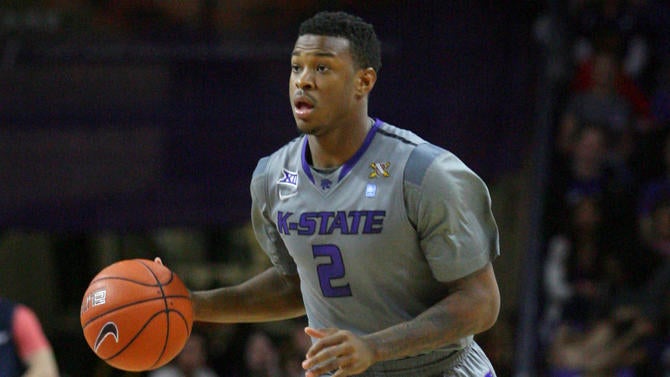
So what did happen?
How did a young man who already was well on his way to college stardom -- and perhaps an NBA career -- go from looking so promising to looking so lost? How did a player who was preseason All-Big 12 team as a sophomore become such a train wreck during that season, an overweight and unmotivated player who saw his minutes and his efficiency drop before being suspended three games during conference play and eventually being run out of town? How did a player whose incredible freshman season was the main reason for Kansas State's surprising success become, with his disaster of a sophomore season, the main reason for Kansas State's 15-17 dud of a year? How did someone who'd rarely gotten in trouble growing up become the kid who looked at college as one big party?
"I looked at my sophomore year being my finishing year," Foster explained three years later. "My sophomore year, I thought I'd figured everything out when really I didn't. I grew up a little bit too fast. I wasn't working out as hard as I was. I was looking forward to the future, going to the NBA, rather than worrying about getting through the year. And it hurt me. I wasn't coachable. I wasn't doing the things that got me into the position I was in."
His mother noticed the difference from Game One of his sophomore year. He just didn't seem the same person. He was a young man testing his newfound independence, so Alvita had to trust that he would find his way, but from Wichita Falls, more than 400 miles south of Manhattan, Kan., she had no idea how bad it had become. The kid who had once lived in the gym now rarely went to the gym. The preternaturally focused young man had fallen in with the wrong crowd. His mother would call him up on the phone: "This isn't you, Marcus," she'd say.
"I'm fine, mom," he'd reply.
What McDermott had seen hints of at the LeBron James Skills Academy that summer had become a full-fledged issue by fall. The idea of becoming an NBA player wasn't just some dream that he could aspire to and work toward. In his mind it became a reality that he expected to happen, no matter the work he put in.
"Everybody's going to deal with [success] different," McDermott says. "It sounds great, but if enough people pay you on the back and tell you how great you are, sooner or later maybe you believe it. And you lose sight of, 'Why am I in this spot in the first place? What have I done to get here?' "
The NBA had once been a motivation. Now it was a distraction, something that had poisoned his mind.
"You change up your play," Foster said. "You're trying to play like these NBA guys -- you just need to play like the person that got the NBA people to look at you in the first place. I'm over here trying to do step-back jump shots, doing stuff that I didn't even work on, but doing it because I see the NBA guys doing it. And it wasn't working for my game, really. It was hurting me more than anything."
Kansas State coach Bruce Weber suspended him. Then he dismissed him from the team. A year that started with so much promise had ended as a nightmare. His NBA dreams were on hold – no team was going to draft a player who had regressed so much as a sophomore and had become so toxic to his team – so he decided to transfer. He picked Creighton, the school that was his second choice coming out of high school and a place where the coaches still knew the Marcus Foster of old. They thought they could get that player back.
Before Foster moved to Omaha for a new start, his mother visited with McDermott. She had a very simple message for the coach: "I want my son back."
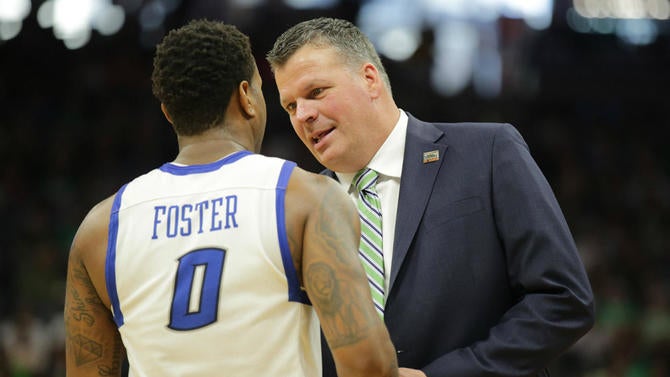
Marcus Foster is sitting in the bustling lobby of a Marriott hotel in Kansas City. Jay-Z and Young Thug are cued up on his Beats headphones. Creighton fans had driven down from Omaha by the masses and would fill the Sprint Center the next couple days. The fans would see Creighton show why it should be a top-tier Big East team this season and how Foster has returned to the basketball-obsessed boy his parents raised.
Foster is discussing deep stuff right now -- growing from an immature kid to a mature young man, ditching the bad habits that brought him down, blocking out the noise that had helped him lose his focus a few years back -- but every few minutes, a Creighton fan walks up to him. They just want to say "hi," catch a glimpse, offer him words of encouragement and thanks. He's wearing these brand-new gold Nike Foamposite shoes and a huge smile as he ponders all that grew out of his darkness.
The biggest blessing from that darkness was this: a daughter, Jazmine. Foster and his longtime girlfriend, Chelsea Ghasemi, whom he met at Kansas State, welcomed their baby on Sept. 29, shortly before Foster's final collegiate season. He got lucky: A beautiful and relatively easy baby girl, who goes to sleep at midnight, sleeps all the way until 7 a.m., takes a bottle and then goes down for a nap.
He found out Ghasemi was pregnant in the middle of last season. It scared him: Time to grow up. Time to take care of another human being, not just himself. He would stay up late with then-Creighton teammate Justin Patton and talk about how their lives were changing, as Foster was about to become a dad and as Patton was debating whether to put his name into the NBA Draft after his redshirt freshman season.
Foster wondered about that for himself, too: Should he leave after his junior year and try for the NBA? But with a child on the way, Foster decided to stay in school. Be a role model for his daughter. Get his degree in criminal justice, in the hope of someday becoming a juvenile probation officer, someone who could use his own story of personal failings to show juveniles they could turn things around just like he did. He didn't even put his name in for the draft to get feedback from NBA teams. He knew what he needed to work on.
"I just wanted to take this offseason and work harder than I ever have," Foster said. "I knew what I needed to focus on. I wanted to lock in, work for a full six months and be prepared for the season. I knew I wanted to come back. And I'm able to tell my daughter I got my degree."
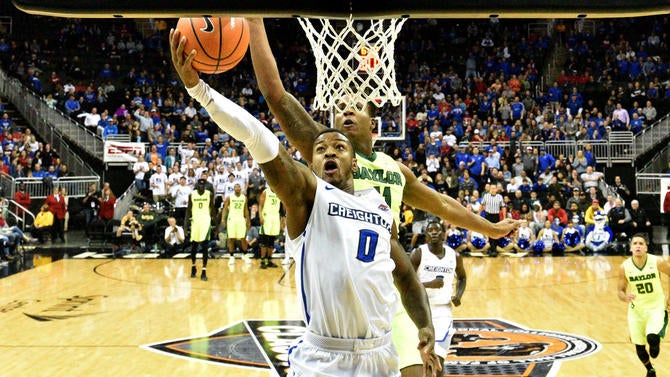
There's no telling whether that NBA dream will come true. But the final chapter of his collegiate career has certainly begun on a high note. Foster is averaging the most points (18) and minutes (29) for a Creighton team that boasts a beautiful, free-flowing and incredibly efficient offense. Foster is shooting 38 percent from 3 and taking fewer forced shots than ever before. On Friday, Creighton and Foster will face another big test when the Bluejays visit 15th-ranked Gonzaga, another program that over the past decade has like Creighton ascended to the upper echelon of college basketball.
"He was humbled by his experience, but he also realizes nobody owed him a second chance – that some guys don't get a second opportunity," McDermott said. "We were offering him that chance to help him rebuild his image. To his credit he's been able to do that."
There's another cliché that fits Foster to a T: If it doesn't kill you, it makes you stronger. That disaster of a sophomore year didn't kill Marcus Foster's basketball career. When his family sees him now -- a joyous father, a soon-to-be college graduate, a basketball player who has not just recaptured the focus and hard work that he'd shown his whole life but built upon it -- they see a fully realized man. They see what they had hoped he would become ever since he was a little boy who suited up in the Hirschi High School basketball jersey and channeled Kobe Bryant in the living room.
"I would not take his K-State experience from him," Alvita Foster said. "He learned from that experience. He learned from it, it got him back-grounded, and it made him a better person and a better player. Sometimes you just gotta be down to get back up and get better. Back then, he thought he had arrived as a player, but he hadn't yet. But now he has definitely arrived as a man."


